一般现在时的讲解及用法
- 格式:docx
- 大小:35.90 KB
- 文档页数:7
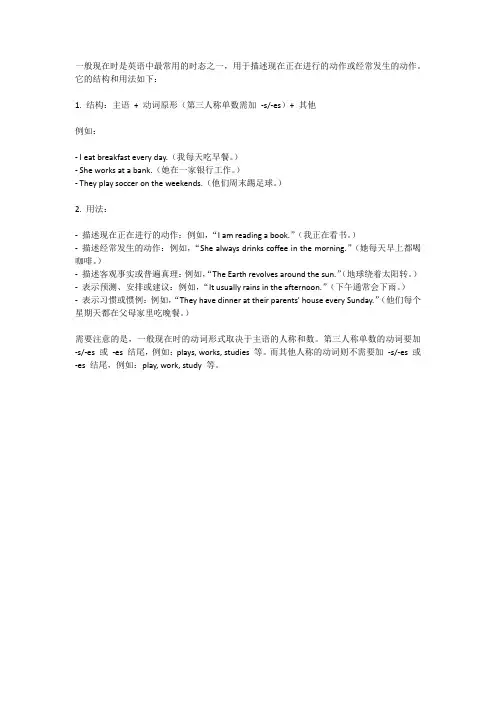
一般现在时是英语中最常用的时态之一,用于描述现在正在进行的动作或经常发生的动作。
它的结构和用法如下:
1. 结构:主语+ 动词原形(第三人称单数需加-s/-es)+ 其他
例如:
- I eat breakfast every day.(我每天吃早餐。
)
- She works at a bank.(她在一家银行工作。
)
- They play soccer on the weekends.(他们周末踢足球。
)
2. 用法:
-描述现在正在进行的动作:例如,“I am reading a book.”(我正在看书。
)
-描述经常发生的动作:例如,“She always drinks coffee in the morning.”(她每天早上都喝咖啡。
)
-描述客观事实或普遍真理:例如,“The Earth revolves around the sun.”(地球绕着太阳转。
)-表示预测、安排或建议:例如,“It usually rains in the afternoon.”(下午通常会下雨。
)
-表示习惯或惯例:例如,“They have dinner at their parents' house every Sunday.”(他们每个星期天都在父母家里吃晚餐。
)
需要注意的是,一般现在时的动词形式取决于主语的人称和数。
第三人称单数的动词要加-s/-es 或-es 结尾,例如:plays, works, studies 等。
而其他人称的动词则不需要加-s/-es 或-es 结尾,例如:play, work, study 等。
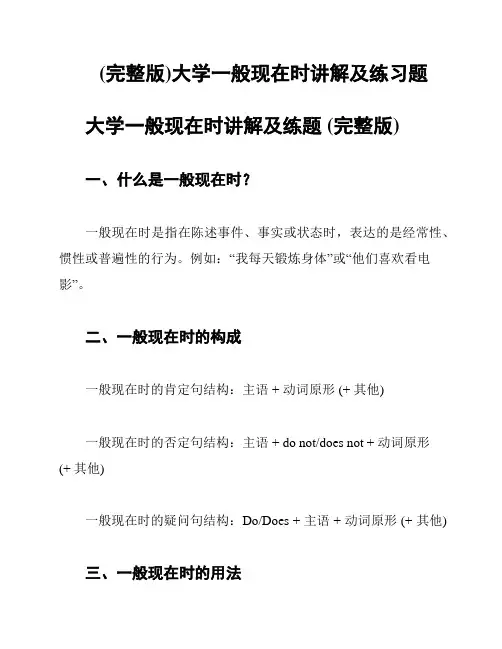
(完整版)大学一般现在时讲解及练习题大学一般现在时讲解及练题 (完整版)一、什么是一般现在时?一般现在时是指在陈述事件、事实或状态时,表达的是经常性、惯性或普遍性的行为。
例如:“我每天锻炼身体”或“他们喜欢看电影”。
二、一般现在时的构成一般现在时的肯定句结构:主语 + 动词原形 (+ 其他)一般现在时的否定句结构:主语 + do not/does not + 动词原形(+ 其他)一般现在时的疑问句结构:Do/Does + 主语 + 动词原形 (+ 其他)三、一般现在时的用法1. 表示客观事实、真理或普遍现象,常常与表示频率的副词一起使用。
例如:“水烧开时会冒泡”。
2. 表示经常性或惯性的行为。
例如:“我每天都喝咖啡”。
3. 表示现阶段的情况或状态。
例如:“我现在住在中国”。
4. 在叙述历史事件或小说情节时,使用一般现在时可以增加紧迫感和现场感。
例如:“他打开门,走进了房间”。
四、一般现在时的练题1. 填入适当的动词形式:- She ____(have) two cats.- They ____(go) to school every day.- My father ____(work) as a doctor.2. 句子改为否定句:- I eat breakfast every morning.- She likes to read books.- We play tennis on weekends.3. 根据题意回答问题:- When do you usually go to bed? - Does he watch TV every evening? - How often does she go shopping?4. 将下列句子改为一般疑问句:- You live in London.- They play football in the park.- She enjoys dancing.五、答案1. 填入适当的动词形式:- She has two cats.has two cats.- They go to school every day.go to school every day. - My father works as a doctor.works as a doctor.2. 句子改为否定句:- I do not eat breakfast every morning.- She does not like to read books.- We do not play tennis on weekends.3. 根据题意回答问题:- I usually go to bed at 11 PM.- Yes, he watches TV every evening.- She goes shopping once a week.4. 将下列句子改为一般疑问句:- Do you live in London?- Do they play football in the park?- Does she enjoy dancing.希望以上内容对你理解和练一般现在时有所帮助!如有任何问题,请随时向我提问。
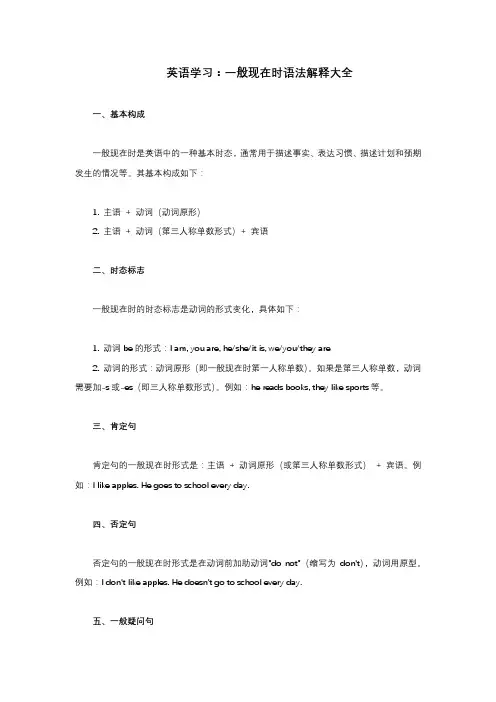
英语学习:一般现在时语法解释大全一、基本构成一般现在时是英语中的一种基本时态,通常用于描述事实、表达习惯、描述计划和预期发生的情况等。
其基本构成如下:1. 主语+ 动词(动词原形)2. 主语+ 动词(第三人称单数形式)+ 宾语二、时态标志一般现在时的时态标志是动词的形式变化,具体如下:1. 动词be的形式:I am, you are, he/she/it is, we/you/they are2. 动词的形式:动词原形(即一般现在时第一人称单数)。
如果是第三人称单数,动词需要加-s或-es(即三人称单数形式)。
例如:he reads books, they like sports等。
三、肯定句肯定句的一般现在时形式是:主语+ 动词原形(或第三人称单数形式)+ 宾语。
例如:I like apples. He goes to school every day.四、否定句否定句的一般现在时形式是在动词前加助动词"do not"(缩写为don't),动词用原型。
例如:I don't like apples. He doesn't go to school every day.五、一般疑问句一般疑问句的一般现在时形式是把助动词"do"或"does"放在句首,动词用原型。
例如:Do you like apples? Does he go to school every day?六、特殊疑问句特殊疑问句的一般现在时形式是以疑问词开头,后面接一般疑问句。
例如:What do you like? Where does he go to school?七、第三人称单数当主语是第三人称单数(he/she/it)时,动词需要变为第三人称单数形式,一般在动词后加-s或-es。
例如:he reads books, she goes to the park等。
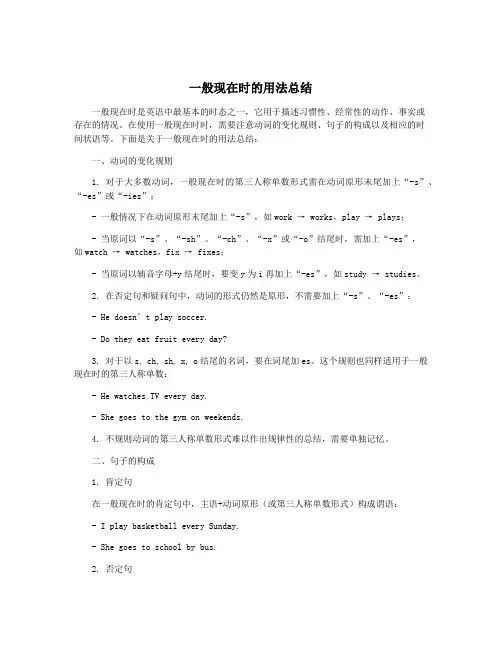
一般现在时的用法总结一般现在时是英语中最基本的时态之一,它用于描述习惯性、经常性的动作、事实或存在的情况。
在使用一般现在时时,需要注意动词的变化规则、句子的构成以及相应的时间状语等。
下面是关于一般现在时的用法总结:一、动词的变化规则1. 对于大多数动词,一般现在时的第三人称单数形式需在动词原形末尾加上“-s”、“-es”或“-ies”:- 一般情况下在动词原形末尾加上“-s”,如work → works,play → plays;- 当原词以“-s”、“-sh”、“-ch”、“-x”或“-o”结尾时,需加上“-es”,如watch → watches,fix → fixes;- 当原词以辅音字母+y结尾时,要变y为i再加上“-es”,如study → studies。
2. 在否定句和疑问句中,动词的形式仍然是原形,不需要加上“-s”、“-es”:- He doesn’t play soccer.- Do they eat fruit every day?3. 对于以s, ch, sh, x, o结尾的名词,要在词尾加es。
这个规则也同样适用于一般现在时的第三人称单数:- He watches TV every day.- She goes to the gym on weekends.4. 不规则动词的第三人称单数形式难以作出规律性的总结,需要单独记忆。
二、句子的构成1. 肯定句在一般现在时的肯定句中,主语+动词原形(或第三人称单数形式)构成谓语:- I play basketball every Sunday.- She goes to school by bus.2. 否定句在一般现在时的否定句中,需在助动词“do”(或“does”)和动词原形之间加上“not”构成否定形式:- I do not play tennis on Mondays.- He does not like coffee.也可以用缩写形式来构成否定句,即使用助动词的缩写形式+not,如doesn’t, don’t:- She doesn’t go to the gym on weekends.- They don’t watch TV in the morning.3. 疑问句在一般现在时的疑问句中,需将助动词“do”(或“does”)置于主语之前构成疑问句:- Do you like swimming?- Does she speak Chinese?与否定句类似,也可以使用助动词的缩写形式来构成疑问句:- Do they go to the library every day?- Does he play the guitar?4. 特殊疑问句对于一般现在时的特殊疑问句,需要用疑问词来引导,并按照一般疑问句的结构构成句子。
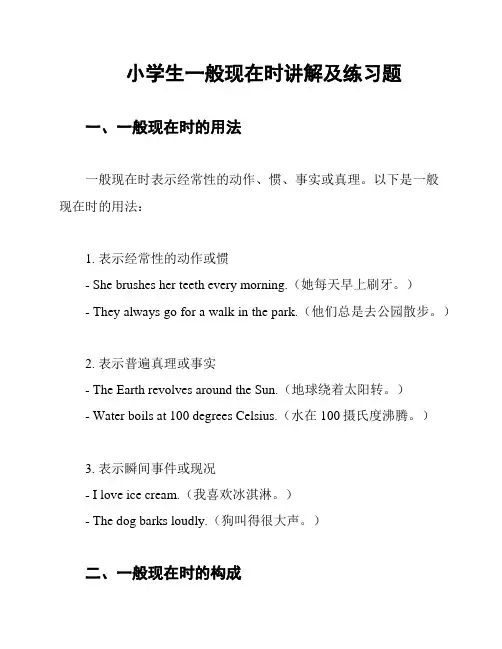
小学生一般现在时讲解及练习题一、一般现在时的用法一般现在时表示经常性的动作、惯、事实或真理。
以下是一般现在时的用法:1. 表示经常性的动作或惯- She brushes her teeth every morning.(她每天早上刷牙。
)- They always go for a walk in the park.(他们总是去公园散步。
)2. 表示普遍真理或事实- The Earth revolves around the Sun.(地球绕着太阳转。
)- Water boils at 100 degrees Celsius.(水在100摄氏度沸腾。
)3. 表示瞬间事件或现况- I love ice cream.(我喜欢冰淇淋。
)- The dog barks loudly.(狗叫得很大声。
)二、一般现在时的构成在一般现在时中,动词的变化相对简单。
1. 对于第三人称单数(He/She/It),动词要加-s或-es。
- He walks to school every day.(他每天走路去学校。
)- She eats an apple.(她吃一个苹果。
)- It runs fast.(它跑得很快。
)2. 对于其他人称(I/You/We/They),动词不变。
- I play soccer on weekends.(我周末踢足球。
)- You read books every night.(你每晚读书。
)- We go swimming in summer.(我们夏天去游泳。
)- They watch movies together.(他们一起看电影。
)三、练题请根据句意填入正确的动词形式。
1. My mother __________ (cook) dinner for us every evening.2. Tom and Lisa __________ (play) tennis on Saturdays.3. The sun __________ (rise) in the east.4. We __________ (study) English at school.5. Dogs __________ (bark) when they see strangers.1. cooks2. play3. rises4. study5. bark希望以上讲解和练习题对你有帮助!。
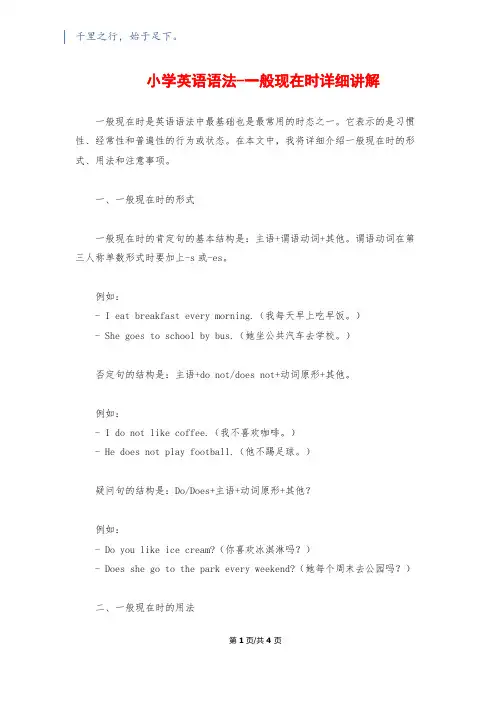
小学英语语法-一般现在时详细讲解一般现在时是英语语法中最基础也是最常用的时态之一。
它表示的是习惯性、经常性和普遍性的行为或状态。
在本文中,我将详细介绍一般现在时的形式、用法和注意事项。
一、一般现在时的形式一般现在时的肯定句的基本结构是:主语+谓语动词+其他。
谓语动词在第三人称单数形式时要加上-s或-es。
例如:- I eat breakfast every morning.(我每天早上吃早饭。
)- She goes to school by bus.(她坐公共汽车去学校。
)否定句的结构是:主语+do not/does not+动词原形+其他。
例如:- I do not like coffee.(我不喜欢咖啡。
)- He does not play football.(他不踢足球。
)疑问句的结构是:Do/Does+主语+动词原形+其他?例如:- Do you like ice cream?(你喜欢冰淇淋吗?)- Does she go to the park every weekend?(她每个周末去公园吗?)二、一般现在时的用法第1页/共4页1. 表示习惯或经常性的动作:- I write in my diary every night.(我每天晚上写日记。
)- They play basketball every Sunday.(他们每个星期天打篮球。
)2. 表示客观事实、自然规律或科学真理:- Water boils at 100 degrees Celsius.(水在100摄氏度时煮沸。
)- The sun rises in the east.(太阳从东方升起。
)3. 表示感觉、想法和喜好:- I love chocolate.(我喜欢巧克力。
)- He hates to wake up early.(他讨厌早起。
)4. 表示现时状态或现时临时的动作:- I am a student.(我是一个学生。
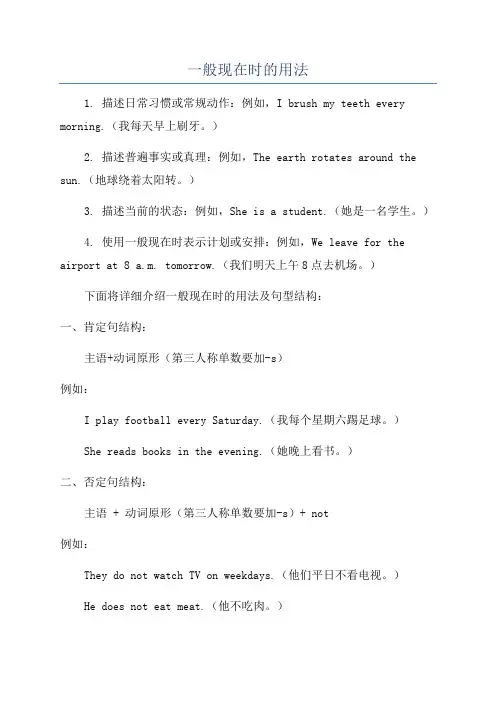
一般现在时的用法1. 描述日常习惯或常规动作:例如,I brush my teeth every morning.(我每天早上刷牙。
)2. 描述普遍事实或真理:例如,The earth rotates around the sun.(地球绕着太阳转。
)3. 描述当前的状态:例如,She is a student.(她是一名学生。
)4. 使用一般现在时表示计划或安排:例如,We leave for the airport at 8 a.m. tomorrow.(我们明天上午8点去机场。
)下面将详细介绍一般现在时的用法及句型结构:一、肯定句结构:主语+动词原形(第三人称单数要加-s)例如:I play football every Saturday.(我每个星期六踢足球。
)She reads books in the evening.(她晚上看书。
)二、否定句结构:主语 + 动词原形(第三人称单数要加-s)+ not例如:They do not watch TV on weekdays.(他们平日不看电视。
)He does not eat meat.(他不吃肉。
)三、疑问句结构:Do/Does + 主语 + 动词原形?例如:Do you like ice cream?(你喜欢冰淇淋吗?)Does she speak English?(她会说英语吗?)四、特殊疑问句结构:疑问词 + do/does + 主语 + 动词原形?例如:Where do you live?(你住在哪里?)How does she go to work?(她怎么去上班?)五、使用时间状语的句子:时间状语+主语+动词原形(第三人称单数要加-s)例如:I usually go for a walk in the evening.(我通常晚上去散步。
)She often visits her grandparents on weekends.(她经常在周末去看望她的祖父母。
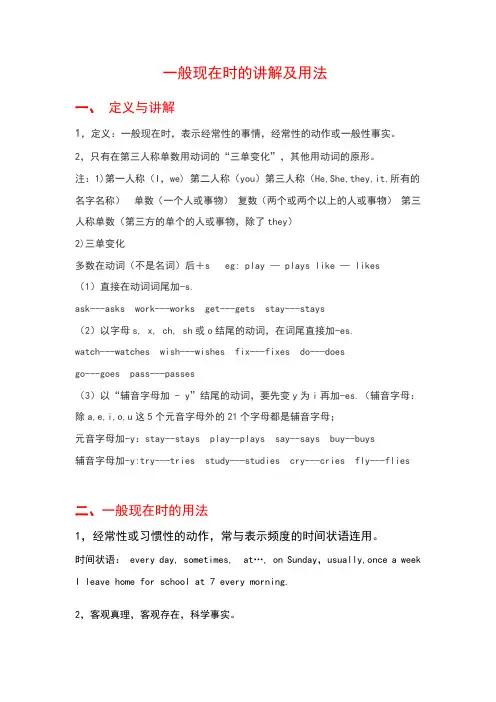
一般现在时的讲解及用法一、定义与讲解1,定义:一般现在时,表示经常性的事情,经常性的动作或一般性事实。
2,只有在第三人称单数用动词的“三单变化”,其他用动词的原形。
注:1)第一人称(I,we) 第二人称(you)第三人称(He,She,they,it,所有的名字名称)单数(一个人或事物)复数(两个或两个以上的人或事物)第三人称单数(第三方的单个的人或事物,除了they)2)三单变化多数在动词(不是名词)后+s eg: play — plays like — likes(1)直接在动词词尾加-s.ask---asks work---works get---gets stay---stays(2)以字母s, x, ch, sh或o结尾的动词,在词尾直接加-es.watch---watches wish---wishes fix---fixes do---doesgo---goes pass---passes(3)以“辅音字母加 - y”结尾的动词,要先变y为i再加-es.(辅音字母:除a,e,i,o,u这5个元音字母外的21个字母都是辅音字母;元音字母加-y:stay--stays play--plays say--says buy--buys辅音字母加-y:try---tries study---studies cry---cries fly---flies二、一般现在时的用法1,经常性或习惯性的动作,常与表示频度的时间状语连用。
时间状语: every day, sometimes, at…, on Sunday,usually,once a week I leave home for school at 7 every morning.2,客观真理,客观存在,科学事实。
The earth goes around the sun.3,表示格言或警句中。
Practice makes perfect. 熟能生巧。
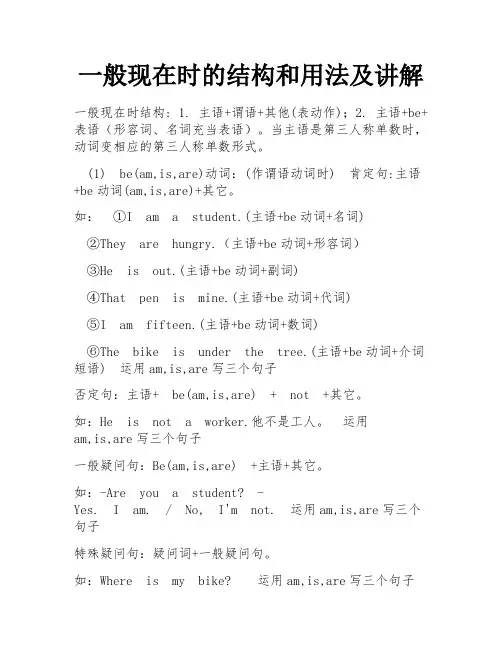
一般现在时的结构和用法及讲解一般现在时结构: 1. 主语+谓语+其他(表动作);2. 主语+be+表语(形容词、名词充当表语)。
当主语是第三人称单数时,动词变相应的第三人称单数形式。
(1) be(am,is,are)动词:(作谓语动词时) 肯定句:主语+be动词(am,is,are)+其它。
如:①I am a student.(主语+be动词+名词)②They are hungry.(主语+be动词+形容词)③He is out.(主语+be动词+副词)④That pen is mine.(主语+be动词+代词)⑤I am fifteen.(主语+be动词+数词)⑥The bike is under the tree.(主语+be动词+介词短语) 运用am,is,are写三个句子否定句:主语+ be(am,is,are) + not +其它。
如:He is not a worker.他不是工人。
运用am,is,are写三个句子一般疑问句:Be(am,is,are) +主语+其它。
如:-Are you a student? -Yes. I am. / No, I'm not. 运用am,is,are写三个句子特殊疑问句:疑问词+一般疑问句。
如:Where is my bike? 运用am,is,are写三个句子特殊疑问句:疑问词(what, where, who, when, which, whose, how, ho w many, how much, what shape,what colour,),找句子中有没有be动词(is, am或者are)或情态动词或者助动词(特殊疑问句:疑问词+be动词(is, am或者are)或情态动词或者助动词+其他?)(2)行为动词:主语+行为动词+(其它)1.主语不是第三人称单数时,肯定句为:主语+动词原形+其它否定式为:主语+don't+动词原形+其它疑问句为:Do+主语+动词原形+其它?e.g. ①We speak Chinese.②Do you speak Chinese? ---Yes, I do. / No, I don't.③They don't speak Chinese. 写三个句子2.当主语是第三人称单数时:(he,she,it,A/An,单独的人或事物:Lily/book)肯定句为:主语+动词(词尾加s或es)+其它。

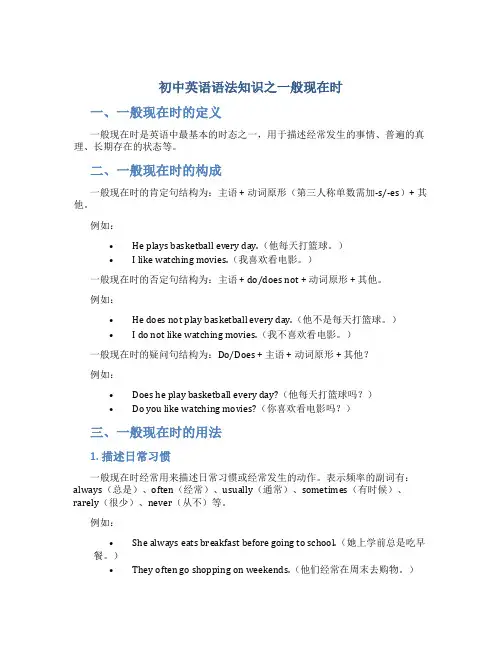
初中英语语法知识之一般现在时一、一般现在时的定义一般现在时是英语中最基本的时态之一,用于描述经常发生的事情、普遍的真理、长期存在的状态等。
二、一般现在时的构成一般现在时的肯定句结构为:主语 + 动词原形(第三人称单数需加-s/-es)+ 其他。
例如:•He plays basketball every day.(他每天打篮球。
)•I like watching movies.(我喜欢看电影。
)一般现在时的否定句结构为:主语 + do/does not + 动词原形 + 其他。
例如:•He does not play basketball every day.(他不是每天打篮球。
)•I do not like watching movies.(我不喜欢看电影。
)一般现在时的疑问句结构为:Do/Does + 主语 + 动词原形 + 其他?例如:•Does he play basketball every day?(他每天打篮球吗?)•Do you like watching movies?(你喜欢看电影吗?)三、一般现在时的用法1. 描述日常习惯一般现在时经常用来描述日常习惯或经常发生的动作。
表示频率的副词有:always(总是)、often(经常)、usually(通常)、sometimes(有时候)、rarely(很少)、never(从不)等。
例如:•She always eats breakfast before going to school.(她上学前总是吃早餐。
)•They often go shopping on weekends.(他们经常在周末去购物。
)2. 表达客观事实或普遍真理一般现在时也被用来表达客观事实或普遍真理。
例如:•The Earth revolves around the sun.(地球绕太阳运行。
)•Water boils at 100 degrees Celsius.(水在100摄氏度沸腾。
一般现在时讲解一般现在时:可用于陈述现在时间内发生或存在的事件、动作或情况。
1、用法:1) 表示经常性或习惯性的动作,常与表示频度的时间状语连用。
时间状语:often, always, usually, sometimes ,everymorning/night/evening/day/week ,twice aweek ,never.如:I read English every morning. 我每天早上读英语。
She sometimes goes shopping on Sundays. 她有时候星期天去购物。
2) 陈述客观真理,科学事实。
如:The earth moves around the sun. 地球绕着太阳转。
Shanghai lies in the east of China. 上海立于中国的东方。
3)用于现阶段内发生的情况。
如:My father works in a school.我的爸爸在学校工作。
4) 用于格言或警句中。
如:Pride goes before a fall. 骄者必败。
5)当谈论的是时间表、节目单或日程表上所安排好的事情的时候,通常用现在时表示将来的意义。
如:The concert begins at 7:30 and ends at 9:30.音乐会于7;30开始,9:30结束。
6) 一般现在时be动词情况: am,is,are也可以做一般现在时的助动词。
如:I am a student.我是一个学生。
2、构成:主语(第一、二人称和复数)+ 动词原形 + 宾语主语(第三人称单数)+ 动词词尾要加-S + 宾语3、动词变单三的规则:(1)一般在动词词尾直接加-S。
如:buy--buys;drive—drives;run--runs以o/s/x/sh/ch结尾的动词词尾加-es。
如:do—does;fix—fixes;watch--watches (2)(3)以“辅音字母+y”结尾的动词把y变成i,再加-es。
一般现在时讲解什么是一般现在时?一般现在时是英语中最基本的时态之一,表示现在经常发生或普遍存在的动作、习惯、真理或状态。
在句子中,一般现在时使用主语的原形动词加上第三人称单数或复数的词形变化。
例如:she plays tennis every weekend(她每个周末打网球)。
一般现在时的使用场景:1. 经常性动作一般现在时经常用于表示一种经常或重复发生的动作。
例如:•I walk my dog every morning.(我每天早上遛狗。
)•They eat dinner at 6 p.m. every day.(他们每天晚上六点吃晚饭。
)2. 习惯或规律一般现在时还可以用于表示一种习惯或规律。
例如:•He always drinks coffee in the morning.(他每天早上都喝咖啡。
)•We never go to bed before 11 p.m.(我们从不在晚上11点之前睡觉。
)3. 真理或普遍规律一般现在时也可以用于陈述普遍真理或规律。
例如:•The sun rises in the east.(太阳从东方升起。
)•Water boils at 100 degrees Celsius.(水在100摄氏度沸腾。
)一般现在时的用法:1. 肯定句在肯定句中,一般现在时使用主语的原形动词。
例如:•He eats breakfast every morning.(他每天早上吃早饭。
)•They go to school by bus.(他们乘公交车上学。
)2. 否定句在否定句中,一般现在时使用do not或does not连接主语与动词的原形形式。
例如:•She does not like coffee.(她不喜欢咖啡。
)•They do not play football on Sundays.(他们星期天不踢足球。
)3. 疑问句在疑问句中,一般现在时使用do或does加上主语和动词的原形形式。
一般现在时一、一般现在时的用法1.表示经常发生的动作。
如:We go to school at seven every day. 我们每天七点钟上学。
2.说明目前存在的情况或状态。
如:There are some students in the classroom. 教室有几个学生。
3.表示主语的习惯、能力、职业、特征等。
如: Lucy speaks English very well. 露西英语说得很好。
Miss Gao teaches English。
高小姐教英语。
My father get up very early.我父亲起得很早。
4.说明不受时间限制的客观事实或普遍。
The earth moves round the sun.地球绕太阳旋转。
Time and tide wait for no man.时不我待。
二、一般现在时的构成。
1.除第三人称单数外,其余各人称都用动词原形。
如:We like English very much.我们非常喜欢英语。
2.当主语是第三人称单数时,谓语动词应加-s或es(动词后面是辅音字母+y 时,变y为i,加-es)构成,其读音与名词复数相同。
如:He often goes to school on foot.他常常步行去上学。
He studies English hard.他努力学习英语。
3.主语+be(is, am, are)+表语。
如:They are at work。
他们在工作。
三、一般现在时的疑问句1.助动词DO或Does+主语+动词原形+其它成分。
如:Do you study English? 你们学英语吗?Does she study English? 她学英语吗?2.Is(Am, Are)+主语+表语。
如: Are you a student?四、一般现在时的否定式1.在动词前加“助动词do或does +not(缩略式don't, doesn't),其后动词要用原形。
一般现在时基本用法介绍一、一般现在时的意义1.表示事物或人物的特征、状态。
如:The sky is blue.天空是蓝色的。
He is tall.他很高。
2.表示经常性或习惯性的动作(常与usually,always ,sometimes,often,every ...连用)。
如:I get up at six every day.我每天六点起床。
My mother goes hiking every weekend.我妈妈每个周末都要去远足。
He often plays football on the weekend.他周末常常踢足球。
3.表示客观事实,普遍真理。
如:The earth goes around the sun.地球绕着太阳转。
The trees turn green in spring.春天树子要绿。
二、一般现在时的谓语动词形式1.be动词:主语+be(am,is,are)如:I am a boy.我是一个男孩。
2.情态动词+动词原形如:He can fly kites .他会放风筝。
My sister can sing English songs very well.我妹妹唱英文歌曲唱得很好。
3.实义动词(又称行为动词):在一般现在时中,实义动词作谓语动词有两种形式:动词原形和动词的单数第三人称形式(1)动词原形:当主语不是单数第三人称时,谓语动词用原形。
如:We study English.我们学习英语。
I like singing.我喜欢唱歌。
(2)当主语是单数第三人称(he,she ,it以及可以用he, she ,it 代替的名词、名词短语,如Amy,Zhang Peng,my sister,John’s pen pal等)时,谓语动词要使用单数第三人称形式(简称“单三式”或“单三现”。
如:He likes dancing.他喜欢跳舞。
My sister usually goes shopping on the weekend.我妹妹周末常常去购物。
一般现在时的五种基本用法详解一、表示客观事实一般现在时最基本的用法是表示客观事实,即描述我们日常生活中经常发生的事情、存在的状态或者普遍的真理。
例如:1. The sun rises in the east.(太阳从东方升起。
)2. Water boils at 100 degrees Celsius.(水在100摄氏度煮沸。
)3. Cats like to play with yarn.(猫喜欢玩线团。
)二、表示经常性的动作或习惯一般现在时还用于表示经常性的动作或习惯,即反复发生、一贯存在的动作或习惯。
例如:1. He usually drinks coffee in the morning.(他通常早上喝咖啡。
)2. They go for a walk every evening after dinner.(他们每天晚饭后都会散步。
)三、表示现阶段的状态一般现在时还可以表示目前的状态或情况,即用于描述现阶段的情况或存在的状态。
例如:1. I am currently studying at university.(我目前正在大学学习。
)2. The company is expanding its business in Asia.(该公司正在亚洲扩展业务。
)四、表示固定的时间表或日程安排一般现在时还可用于表示固定的时间表或日程安排,通常与表示时间的副词或短语连用。
例如:1. The train leaves at 8 o'clock every morning.(火车每天早上8点离开。
)2. The store opens at 9 am and closes at 6 pm.(商店上午9点开门,下午6点关门。
)五、表示演绎、描绘或评论一般现在时有时还用于演绎、描绘或评论一段已经发生的情节或故事。
例如:1. He walks through the door, looks around and greets everyone.(他走进门,环顾四周,向每个人打招呼。
亠般现在时的讲解及用法、定义与讲解1定义:一般现在时,表示经常性的事情,经常性的动作或一般性事实2, 只有在第三人称单数用动词的三单变化”其他用动词的原形。
注:1)第一人称(I,we)第二人称(you)第三人称(He,She,they,it, 所有的名字名称)单数(一个人或事物)复数(两个或两个以上的人或事物)第三人称单数(第三方的单个的人或事物,除了 they)2)三单变化多数在动词(不是名词)后+ s eg: play — plays like — likes(1)直接在动词词尾加-s.ask---asks work---works get---gets stay---stays(2)以字母s, x, ch, sh 或o结尾的动词,在词尾直接加-es.watch---watches wish---wishes fix---fixes do---doesgo---goes pass-passes(3)以辅音字母加-y ”结尾的动词,要先变y为i再加-es.(辅音字母:除a,e,i,o,u 这5个元音字母外的21个字母都是辅音字母;元音字母力卩-y : stay--stays play--plays say--says buy--buys辅音字母力卩-y:try---tries study-studies cry---cries fly---flies二、一般现在时的用法1, 经常性或习惯性的动作,常与表示频度的时间状语连用。
时间状语: every day, sometimes, at …,on Sun day,usually, once a weekI leave home for school at 7 every morning.2, 客观真理,客观存在,科学事实。
The earth goes around the sun.3,表示格言或警句中。
Practice makes perfect. 熟能生巧。
注意:此用法如果出现在宾语从句中,即使主句是过去时,从句谓语也要用一般现在时。
例: Columbus proved that the earth is round..4, 现在时刻的状态、能力、性格、个性。
Miss wang writes good En glish but does not speak well.5, 在某些以here,there开头的句子中,用一般现在时表示正在发生的动作eg. Here comes a bus . 公交车来了注:与一般现在时连用的时间状语(表示时间的词或词组)(1)表示频率的副词: always,ofte n, usually,sometimes.(2)时间状语: on Sun days,every day ,every morning ,every year. (3)表示频率的词组: once a year,three times a week.动词有三种:实义动词,be动词,情态动词(初一未涉及)5, 一般现在时中,当主语是第三人称单数,动词是实义动词(1)动词变相应的第三人称单数形式(2)肯定句主语+动词s+其它eg.(2011) Bill often gives money to the poor.(3)否定句主语+does n't+动词原形+其它eg. Bill ofte n does n 'give money to the poor.(4)一般疑问句Does+主语+动词原形+其它eg. Does bill ofte n give money to the poor.肯定回答 Yes,主语 +does(Yes,he does)(6)否定回答 No,主语 +doesn't(No,he doesn ')6, 当主语不是第三人称单数时(动词没有三单变化),动词是实义动词(1)肯定句主语+动词原形+其它eg.l want to marry you.(2)否定句主语+don't+动词原形+其它eg.I don 'want to marry you.(3)一般疑问句Do+主语+动词原形+其它eg.Do you want to marry me?肯定回答Yes,主语+do(Yes,I do.)否定回答 No,主语 +don't(No,l don '.)be动词的一般现在时有三种形式,即:am, is, are 。
1. 如果主语是第一人称I时,be动词用amEg.肯定句:I am a stude nt. 我是一名学生。
否定句:am not一般疑问句:Am i肯定/ 否定回答:Yes,i am. No i am not.2. 如果主语是you (你,你们),they (他们,它们,她们)或名词复数(两个以上的人或物)时,be动词必须用are。
如:肯定句,否定句,一般疑问句及肯定、否定回答You are my good frie nd.Tom and Lily are my good frien ds.They are my good frie nds.are 与主语还可缩写。
如:We are= We're , They are =They're, You are = You're。
而 are 与 not 可缩写成 aren't 。
如:They aren't students. 他们不是学生。
但是 am与not不能缩写。
3. 如果主语是单数名词、不可数名词或单数第三人称代词( he, she, it )时,be动词用is。
肯定句/否定句/ 一般疑问句及肯定、否定的回答如:My mother is a teacher. 我的妈妈是一名老师。
He is a stude nt. 他是一名学生。
is 也可与主语缩写,如:He is = He's, My mother is = My mother's 等。
但是This is 不可缩写。
而is与not可缩写成isn't 。
如:This isn't a book. 这不是一本书。
三、课堂练习巩固1, 主语为第三人称单数肯定句: He ___ g ets ____ (get) up at six o' clock. 否定句:doesn' t ,get 一般疑问句:Does he get up at six o ' clock.(肯定,否定回答)2, 主语为第一人称I__get__(get)up at six o' clock. 否定句:I don' t get up at sixo' clock.一般疑问句:Do you get up at six o ' clock.(肯定,否定回答)四、课堂强化练习(一)单项选择题1,The picture _______ n ice.A. looksB. is lookedC. lookD. is look ing2,She _______ down and soon falls asleep.A. liveB. la inC. laidD. sits3,The teacher _________ us to come to school on time.A. askB. ask ingC. asksD. asked4. John always ______ others.A. helpB. helpi ngC. helpsD. to help5. He ______ for eight hours every day.A. workingB. to workC. worksD. worked6. You ' d better ____ at home and ________ your homework.A. to stay, doB. stay, doC. to stay, to doD. stay, to do7. He sits dow n and ___ a rest.A. hav ingB. haveC. to haveD. has8. Un cle Wang n ever ____ a cake.A. makeB. to makeC. maki ngD. makes(二)句子改错1. Is your brother speak En glish?2. Does he likes going fish ing?3. He likes play games after class.4. Mr. Wu teachs us En glish.5. She don ' t do her homework every evening.五、课后练习(一)用动词的适当形式填空1. She __________ (go) to school at seven o ' clock.2. It ' s 6 o' clock. They are ____________ (eat)supper.3. He usually ___________ up at 17:00.(get )4. She_____________ (live) in Beiji ng.5. Amy__________ (be) here just now.6. ______ (be)there a fly on the table just now?7. My father __________ (watch) TV every eve ning .8. My father _______________ (make) toys these days.9. ________ Amy ___________ (read) English every day10. Che n Jie sometimes _________ (go)to the park with hersister.(二)选择填空1 . I want __ homework now.A. doingB. to doC. to do myD. do my2. It's time ___ .A. go to schoolB. play gamesC. to go homeD. todo my homeworks3. ____ you ____ the blackboard?Yes,I am.A. Can, clea nB. Am, clea ningC. Are, clea ningD. Doclea n4. ____ go and help her.A. Let's meB. Let's us5. What are they doing? They are ____ t hings away.A. putB. put ingC. putt ingD. carry6. Do they have a new car? Yes, ___ .7. He often _________ supper at 6:00 in the evening.A. haveB. has c. is hav ing D. is eat ing8. It ' s 6 o ' clock in the morning. He ________ .A. get upB. gets upC. is geti ng upD. is gett ing up9. What are you doing? I ' m ____________ TV.A. watchB. watchesC. to watchD. watchi ng10. We _______________ any Chin ese classes on Friday.A. are havingB. aren ' t havingC. don ' t haveD. are have11. Tom _________an En glish class now.A. is hav ingB. hasC. hav ingD. have12. Are you playi ng basketball? No, we ________A. isn ' tB. aren ' tC. notD. don ' t13. Liste n! The girl __________ in the room.A. singsB. singingC. is singingD. are singing14. The boy is __________ to his teacher.A. say ingB. speak ingC. talki ngD. telli ng(三) 用括号内动词的适当形式填空。